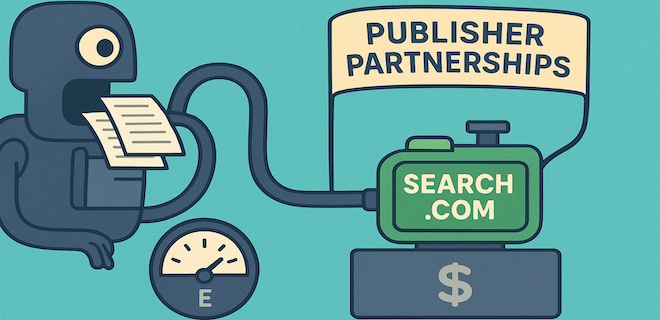
With the integration of its new AI tool, Search.com proposes to pay publishers for their content.
AI search is getting crowded. Google, OpenAI, and a growing roster of new players are racing to redefine what an “answer” looks like.
It’s an exciting shift for users, who now get instant, conversational responses to their search queries. But for publishers, the shift has been unsettling. AI answer engines are trained on publisher content, yet few actually give publishers proper credit in the form of linkbacks or revenue shares.
That’s where Search.com steps in. The search platform has introduced a publisher-first AI search and chat tool that promises something radical in today’s ecosystem: compensation and consent. The search engines blends advertising, subscriptions, and cashback rewards into a partner-friendly business model. For users, the experience is clean and rewarding — offering targeted ads, cashback perks, and premium memberships with enhanced benefits.
Unlike other platforms that scrape and summarize publishers’ content without their permission, Search.com has pledged no scraping without publisher approval. It also gives 60% of ad revenue back to its publisher partners.
Adapting, Not Resisting
Search.com’s commitment feels refreshingly transparent compared to the entitlement of some AI startups and Big Tech companies, said Matthew Keys, founder and editor of TheDesk.net, a site that covers the media business. And it offers a model for how publishers and AI search can work together in mutually beneficial ways, he said.
“If AI search is inevitable, publishers can either fight the tide or shape it,” Keys told AdMonsters. “Search.com is actually inviting us to participate.”
Publishers need to accept that AI search “isn’t going away,” Keys said. “It’s here, it’s getting better, and it’s not something you can regulate out of existence.”
While some publishers may long for the good ol’ days of organic search traffic, it’s time for the ecosystem to build new, sustainable models that actually pay content creators fairly, said Keys.
Search.com has the ad tech infrastructure in place to help publishers monetize consumers’ changing AI-based search habits.
The company traces its lineage back through more than two decades of ad tech history. It has its roots in Ad.com, a search advertising solution founded in 1998, which acquired Public Good, a purpose-driven marketing platform, in July.
“We’re not just layering APIs from ChatGPT,” said Melissa Anderson, President of Search.com. “We’ve built our own stack.”
That stack enables Search.com to position itself as an incremental search channel for advertisers and an incremental revenue stream for publishers. Or, as Anderson put it, “a Swiss Army knife for monetization.”
Through its proprietary DMP, Search.com has access to 230M+ user profiles. It sends 1.4 trillion daily bid requests, connecting advertisers directly to publisher inventory.
Search.com also boasts integrations with yield optimization solution Yield.com and contextual targeting solution Contextual.com (both of which are owned by publisher ad network AdMedia), as well as another ad network, Monetize.com, and language localization platform InText.
As part of its AI search offering, Search.com also gives publishers free access to AI-powered search and chat tools. Publishers can embed AI searchbars on their sites, chat widgets inside articles, or contextual “read more” links that drive deeper engagement.
Onboard With Onboarding
For publishers, Search.com’s value proposition lies not just in its promise of revenue sharing but in how it prioritizes easy onboarding for publishers.
“They’re trying to make the experience of integrating their chat widget as easy as possible,” Keys said. “It’ll be as simple as embedding a YouTube video into a story.”
Before integration, Search.com conducts a brand safety and quality evaluation to ensure the publisher’s content aligns with advertiser standards, Keys said. “Once you clear that, you move into the technical setup.”
While TheDesk.net is still at the beginning stages of integrating into Search.com’s solution, Keys said he has been impressed by the company’s transparency and patience during the onboarding process.
“They didn’t want to put out a chat widget that wasn’t ready for prime time,” he said. “It has to work for users, advertisers, and publishers. I’m encouraged that they’re thinking so deliberately about all three.”
When AI Eats Its Own Supply
That degree of deliberation – rather than rushing to jump on the AI search trend – further distinguishes Search.com from its competitors, according to Keys.
Keys added that he doesn’t think Google and other AI search companies are out to kill journalism, but they’ve nevertheless put publishers in a financial chokehold in the race to corner the AI search market.
“I don’t think anyone set out to hurt the industry,” he said. “They just didn’t think through how their rush to market would do it.”
However, companies like Search.com that put publisher relationships first offer a more sustainable path forward for the open internet. And that publisher-first model could help prevent the mass extinction event publishers fear from AI search’s rapid changes to content discovery.
In contrast, AI companies that scrape publisher sites without permission or payment could actually be limiting their long-term prospects.
If AI companies keep pulling from publishers without real compensation, Keys warned, they’re essentially cutting off their own information supply. And, if these AI platforms don’t help publishers sustain their businesses, he added, that source of information is going to dry up.